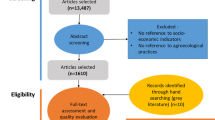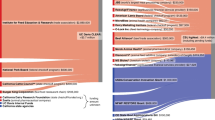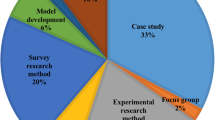Abstract
Third-party certification is an increasingly prevalent tactic which agrifood activists use to “help” consumers shop ethically, and also to reorganize commodity markets. While consumers embrace the chance to “vote with their dollar,” academics question the potential for labels to foster widespread political, economic, and agroecological change. Yet, despite widespread critique, a mounting body of work appears resigned to accept that certification may be the only option available to activist groups in the context of neoliberal socio-economic orders. At the extreme, Guthman (Antipode 39(3): 457, 2007) posits that “at this political juncture… ‘there is no alternative.” This paper offers a different assessment of third-party certification, and points to interventions that are potentially more influential that are currently available to activist groups. Exploring the evolution of the Non-GMO Project—a novel certification for foods that are reasonably free of genetically engineered (GE) material—I make two arguments. First, I echo the literature’s critical perspective by illustrating how certification projects become vulnerable to industry capture. Reviewing its history and current context, I suggest that the Non-GMO Project would be better suited to helping companies avoid mounting public criticism than to substantially reorient agrifood production. Second, I explore the “politics of the possible” in the current political economy and argue that while neoliberalization and organizers’ places within the food system initially oriented the group towards the private sector, the choice to pursue certification arose directly from two industry partnerships. Consequently, current trends might favor market mechanisms, but certification is only one possible intervention that has emerged as a result of particular, and perhaps avoidable, circumstances. The article offers tentative delineation of alternatives ways that activists might intervene in agrifood and political economic systems given present constraints.

Similar content being viewed by others
Notes
In this paper, GE foods and GMO foods refer to products with constituents derived from seeds with genetic structure that has somehow manipulated (e.g., genes added, deleted or reversed) through recombinant DNA technology. Although GE technology is slowly being applied to livestock, widespread use as meat of such animals has not occurred to date. The paper, and the Non-GMO Project, focus on plant products or livestock raised on plant products. I reserve GMO for specific references to the Non-GMO Project because although GMO is widely recognized to stand for GE, the two terms are not synonymous. GE refers specifically to products created through rDNA processes, while GMO is a more general term used to denote any organism with a genetic structure that has been modified through human intervention (e.g., plant breeding). The distinction is important because the FDA prohibits the use of the term GMO and recommends instead the use of the terms “agricultural biotechnology” or “genetic engineering.” Also, proponents of these technologies have capitalized on the slippage in GMO to argue for that the technology does not represent a significant departure from past practices (Fedoroff and Brown 2004).
I focused only to third-party certification, a type of certification provided by private entities outside the manufacturing industry. It is beyond the scope of this discussion to explore similar trends in first and second-party certification systems, although such a project is worthy of future investigation. For details on the difference between these certification types see Gereffi et al. (2001).
Very broadly, neoliberalization refers to the restructuring of political economies along classical liberal lines. Although the process works differently across space (owing in part from contestation by civil society and their interactions with existing political economic landscape), it is generally characterized by a retraction of state intervention in economic functions, including environmental and social regulation of production, a concomitant faith in the self-regulating market to reach socially optimal forms, a focus on individual choice and responsibility as the determinant of political economic processes, and a reliance on civil society to redress market failures (i.e., environmental and social problems) (Harvey 2005; McCarthy 2006).
The Board of Directors hoped to expand assessment in future to include end-product testing.
Personal interview, 17 August 2006.
Personal interview, 17 August 2006.
While “People Want to Know” officially called participating retailers “signators” no one ever actually signed anything. Rather, stores just agreed to have their names added to a list of supporting firms.
Personal interview, 17 August 2006.
Personal Interview, 17 August 2006.
Personal correspondence, 31 May 2007.
I was given a copy of this pamphlet in August, 2007. While this particular brochure is not electronically available as of 1 October 2007, the same text may be found at: http://www.ghorganics.com/CampaigntoTestNaturalFoodsSupplements.htm.
Since this time the Board of Directors created a Technical Advisory Board; however, the majority of members are major natural food manufacturers and retailers.
Personal interview, 28 October 2006.
Personal Communication, Non GMO Project, 28 May 2007.
Soon after the board of directors was re-populated by industry representatives, the Project’s founder quit the campaign. He continues to mobilize against GE crops and foods, but no longer believes the Project will achieve this goal.
LLRICE is the short-hand given to a series of rice varieties (in this case 601 and 62) developed by BayerCrop Science to resist the company’s herbicide, Liberty Link.
This is the logic behind the high tolerance thresholds for mandatory labeling laws in Europe and elsewhere.
Abbreviations
- FDA:
-
U.S. Food and Drug Administration
- GE:
-
Genetically engineered
- GFCA:
-
Global Food Chain Advisors
- GID:
-
Genetic ID
- GMO:
-
Genetically-modified organism
- NGC:
-
Natural Grocery Company
- NGMOP:
-
Non-GMO Project
- UNFI:
-
United Natural Food Inc.
References
Allen, P., M. FitzSimmons, M. Goodman, and K. Warner. 2003. Shifting plates in the agrifood landscape: The tectonics of alternative agrifood initiatives in California. Journal of Rural Studies 19: 61–75.
Allen, P., and M. Kovach. 2000. The capitalist composition of organic: The potential of markets in fulfilling the promise of organic agriculture. Agriculture and Human Values 17: 221–232.
Andow, D., H. Daniell, K. Lamkey, E. Nafziger, P. Gepts, and D. Strayer. 2004. A growing concern: Protecting the food supply in an era of pharmaceutical and industrial crops. Cambridge, MA: Union of Concerned Scientists.
Anonymous. 2006. H.R. 4167 [109th]: National Uniformity for Food Act of 2005. Washington DC: Federal, H.R. 4168.
Bartley, T. 2003. Certifying forests and factories: States, social movements, and the rise of private regulation in the apparel and forest products fields. Politics and Society 31 (3): 433–464.
Bouchie, A. 2002. Organic farmers sue GMO producers. Nature Biotechnology 20: 210.
Brown, S., and C. Getz. 2008. Privatizing farm worker justice: Regulating labor through voluntary certification and labeling. Geoforum 39 (3): 1184–1196.
Busch, L., and C. Bain. 2004. New! Improved? The transformation of the global agrifood system. Rural Sociology 69 (3): 321–346.
Cashore, B. 2002. Legitimacy and the privatization of environmental governance: How non-state market-driven (NSMD) governance systems gain rule-making authority. Governance 15 (4): 503–529.
Crawford, L. M. 2002. FDA Letter to Oregon governor: Labeling GMOs is illegal. http://www.mindfully.org/GE/GE4/FDA-Letter-Labeling-Illegal4oct02.htm. Accessed 29 September 2007.
Cummings, R., and B. Lilliston. 2000. Genetically engineered food: A self-defense guide for consumers. New York: Marlowe and Company.
Dixon, J. 2002. The changing chicken: Chooks, cooks and culinary culture. Sydney: University of New South Wales Press.
Dryzek, J. 1997. The politics of the earth: Environmental discourses. New York: Oxford University Press.
Eisner, M.A. 1993. Regulatory politics in transition. Baltimore, Maryland: John Hopkins University Press.
Ermann, M.D., and W.H. Clements II. 1984. The Interfaith Center on Corporate Responsibility and the campaign against marketing infant formula in the third world. Social Problems 32 (2): 185–196.
Farlow, C.H. 2004. Food additives: A shopper’s guide to what’s safe and what’s not. Escondido, California: KISS for Health Publishing.
Fedoroff, N.V., and N.M. Brown. 2004. Mendel in the kitchen: A scientist’s view of genetically modified foods. Washington, DC: Joseph Henry Press.
Freidberg, S. 2003. The contradictions of clean: Supermarket ethical trade and African horticulture. London: International Institute for Environment and Development.
Gereffi, G., R. Garcia-Johnson, and E. Sasser. 2001. The NGO-industrial complex. Foreign Policy July/August: 56–65.
Getz, C., and A. Shreck. 2006. What organic and Fair Trade labels do not tell us: Towards a place-based understanding of certification. Journal of Consumer Studies 30 (5): 490–501.
Goodman, M. 2004. Reading fair trade: Political ecological imaginary and the moral economy of fair trade foods. Political Geography 23: 891–915.
Greenpeace. 2007. GM contamination register report. Amsterdam: Greenpeace International.
Gulbrandsen, L.H. 2006. Creating markets for eco-labelling: Are consumers insignificant? Journal of Consumer Studies 30 (5): 477–489.
Guldbrandsen, T.C., and D.C. Holland. 2001. Encounters with the super-citizen: Neoliberalism, environmental activism, and the American Heritage Rivers Institute. Anthropological Quarterly 174 (3): 124.
Guthman, J. 1998. Regulating meaning, appropriating nature: The codification of California organic agriculture. Antipode 30 (2): 135–154.
Guthman, J. 2003a. Eating risk: The politics of labeling genetically engineered foods. In Engineering trouble: Biotechnology and its discontents, ed. R. Schurman and D. Kelso, 130–151. Los Angeles: University of California Press.
Guthman, J. 2003b. Fast food/organic food; reflexive tastes and the making of ‘yuppie chow’. Social & Cultural Geography 4 (1): 45.
Guthman, J. 2004. Agrarian dreams: The paradox of organic farming in California. Berkeley: University of California Press.
Guthman, J. 2007. The Polanyian way? Voluntary food labels as neoliberal governance. Antipode 39 (3): 456–478.
Hallman, W.K., W.C. Hebden, C.L. Cuite, H.L. Aquino, and J.T. Lang. 2004. Americans and GM food: Knowledge, opinion and interest in 2004. New Brunswick, New Jersey: Food Policy Institute, Cook College Rutgers—The State University of New Jersey.
Harvey, D. 2005. A brief history of neoliberalism. New York: Oxford University Press.
Haslberger, A. 2001. GMO Contamination of seeds. Nature Biotechnology 19: 613.
Hines, C. 2003. Time to replace globalization with localization. Global Environmental Politics 3 (3): 1–7.
Hudson, I., and M. Hudson. 2003. Removing the Veil? Commodity fetishism, Fair Trade, and the environment. Organization and Environment 16 (4): 413–430.
ICCR. 2007. Annual Report 2006–2007. New York, NY: Interfairth Center on Corporate Responsibility.
Kimbrell, A. 2007. Your right to know: Genetic engineering and the secret changes in your food. Washington, DC: Center for Food Safety.
Lowe, L. 2008. Religious investors urge 63 top U.S. restaurant, food, beverage, candy companies to oppose spring planting of genetically modified sugar beets. http://www.iccr.org/news/press_releases/2008/pr_gmosugarbeets030408.htm. Accessed on 10 March 2008.
Mackay, J. 2006. Whole Foods Blog: Detailed Reply to Pollan Letter, Whole Foods, Austin TX. http://wholefoodsmarket.com/socialmedia/jmackey/2006/06/26/detailed-reply-to-pollan-letter/#more-10. Accessed on 10 July 2008.
Marsden, T., J. Banks, and G. Bristow. 2000. Food supply chain approaches: Exploring their role in rural development. Sociologia Ruralis 40 (4): 424–438.
McCarthy, J. 2006. Neoliberalism and the politics of alternatives: Community forestry in British Columbia and the United States. Annals of the Association of American Geographers 96 (1): 84–104.
McCarthy, J., and W.S. Prudham. 2004. Neoliberal nature and the nature of neoliberalism. Geoforum 35 (3): 275–283.
Mellon, M., and J. Rissler. 2004. Gone to seed: Transgenic contaminants in the traditional seed supply. Cambridge: Union of Concerned Scientists.
Morgan, K., T. Marsden, and J. Murdoch. 2006. Worlds of food: Power, place and provenance in the food chain. Oxford, UK: Oxford University Press.
Murdoch, J., T. Marsden, and J. Banks. 2000. Quality, nature and embeddedness: Some theoretical considerations in the context of the food sector. Economic Geography 76 (2): 107.
Mutersbaugh, T. 2005. Just-in-space: Certified rural products, labor of quality, and regulatory spaces. Journal of Rural Studies 21: 389–402.
Mutersbaugh, T., and D. Klooster. 2005. Certifying rural spaces: Quality-certified products and rural governance. Journal of Rural Studies 21: 381–388.
Ness, C. 2006. Whole Foods taking flak, thinks local. San Francisco: Chronicle, July 26, F-1.
NGMOP. 2007. The Non GMO Project: The North American Organic and Natural Product’s Industry’s Initiative for Non-GMO Verification, FoodChain Global Advisors, Iowa.
NGMOP. 2008a. Welcome to the Non-GMO Project, The Non-GMO Project, Upland CA. http://www.nongmoproject.org/. Accessed on 10 March 2008.
NGMOP. 2008b. Non-GMO Project Working Standard (February 2008). Berkeley, California: The Non-GMO Project.
Perrin, R.K. 2006. Regulation of biotechnology for field crops. In Regulating agricultural biotechnology: Economics and policy, ed. R.E. Just, J.M. Alston, and D. Zilberman, 639–646. New York: Springer.
PIFB. 2005. Public sentiment about genetically modified food: November 2005 update. Washington, DC: Pew Initiative on Food and Biotechnology.
Raynold, L.T., D. Murray, and A. Heller. 2007. Regulating sustainability in the coffee sector: A comparative analysis of third-party environmental and social certification. Agriculture and Human Values 24: 147–163.
Renard, M.C. 1999. The interstices of globalization: The example of fair trade coffee. Sociologia Ruralis 39 (4): 484–500.
Renard, M.C. 2005. Quality certification, regulation and power in fair trade. Journal of Rural Studies 21: 419–431.
Robbins, J. 2001. The food revolution. Berkeley, California: Conari Press.
Roff, R.J. 2007. Shopping for change? Neoliberalizing activism and the limits to eating non-GMO. Agriculture and Human Values 24 (4): 511–522.
Roseboro, K. 2007a. Michael Funk: “Time has come” for the Non-GMO Project. The Organic and Non-GMO report. May: 1–6.
Roseboro, K. 2007b. The Non-GMO Project rises to forefront of natural food industry. The Organic and Non-GMO Report April: 1–3.
Roff, R.J. 2008. “Preempting to nothing”: The fight to de/re-regulate agricultural biotechnology. Geoforum 39 (3): 1423–1438.
Shreck, A. 2005. Resistance, redistribution and power in the Fair Trade banana initiative. Agriculture and Human Values 22: 17–29.
Smith, J. 2003. Seeds of deception: Exposing industry and government lies about the safety of the genetically engineered goods you’re eating. Fairfield, Iowa: Yes! Books.
Smith, J. 2006. How to buy non-GM. Institute for Responsible Technology. http://www.responsibletechnology.org/GMFree/HowtoBuyNon-GMFoods/index.cfm. Accessed on 18 May 2008.
Stewart, K.L. 2007. Eating between the lines: The supermarket shopper’s guide to the truth behind food labels. New York: St. Martin’s Griffin.
True Food Network. 2007. The true food shopping guide. http://www.truefoodnow.org/shoppersguide/guide_printable.html. Accessed 29 September 2007.
Vermij, P. 2006. Liberty Link rice raises specter of tightened regulations. Nature Biotechnology 24 (11): 1301–1302.
Villar, J.L. 2002. GMO contamination around the world. Amsterdam: Friends of the Earth International.
Vogel, G. 2006. Tracing the transatlantic spread of GM rice. Science 313: 1714.
Acknowledgements
This research was supported in part by the Social Science and Humanities Research Council of Canada. I would particularly like to thank my confidential informants for their time and insights during my field research, and Geoff Mann, Harvey James and two anonymous reviewers for their comments on early drafts of this paper.
Author information
Authors and Affiliations
Corresponding author
Rights and permissions
About this article
Cite this article
Roff, R.J. No alternative? The politics and history of non-GMO certification. Agric Hum Values 26, 351–363 (2009). https://doi.org/10.1007/s10460-008-9166-5
Received:
Accepted:
Published:
Issue Date:
DOI: https://doi.org/10.1007/s10460-008-9166-5




